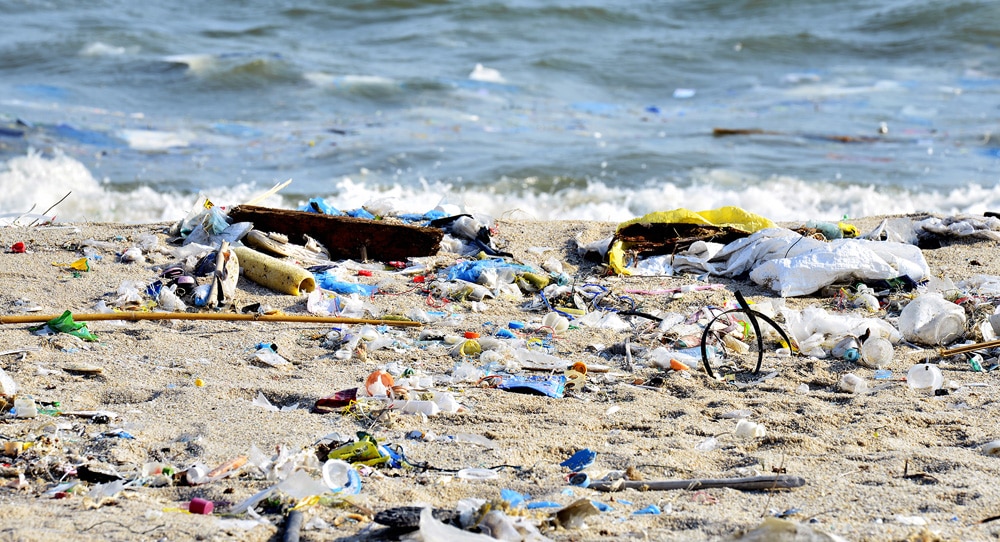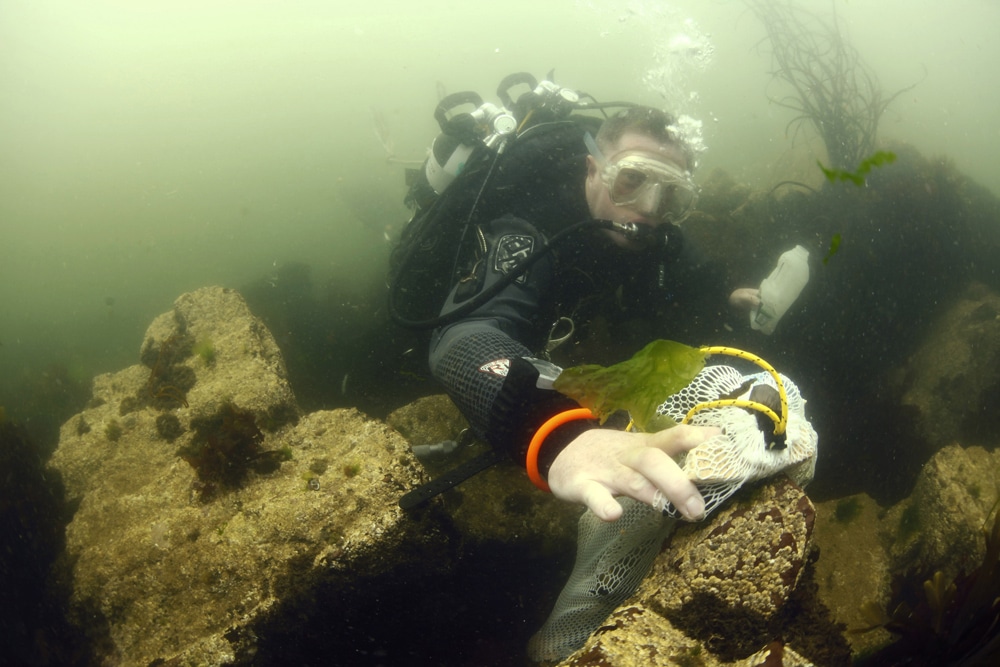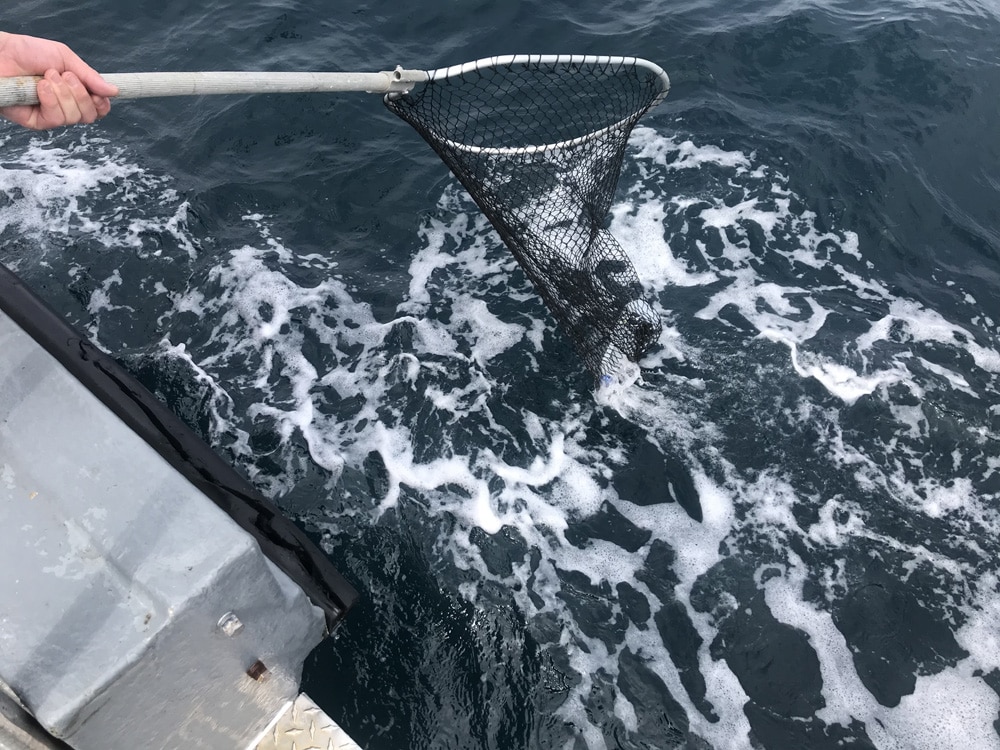News
BSAC urges all divers to help turn the plastic tide

As a diver, it sometimes seems there’s no getting away from plastic. Many components of our kit are plastic-based and essential to the job at hand, but we are also acutely aware of the impact plastic pollution – especially single-use plastic – is having on the marine environment.
According to the Marine Conservation Society, some areas of our ocean contains six times more microplastics than plankton. This is a frightening statistic but together we can turn the tide on the amount of plastic debris reaching our seas.
A DIVER’S GUIDE TO PLASTIC
Here are just a few simple ways as a diver you can help ‘sink’ the problem of single-use plastic….
On dive trips take only essential multi-use plastic (ie, your kit!) on to your RIB, hardboat or shore dive.
When it comes to single-use plastic on dive trips, adopt the ‘DIY, swap or ditch’ approach:
- Take a packed lunch in re-usable or recyclable packaging and swap that on-the-go latte for your own reusable coffee mug or flask.
- Keep hydrated with a reusable water bottle –ask the skipper if they provide water refills and try to avoid disposable plastic water bottles wherever you can. If it’s not possible, check the bottle before you buy to ensure it can be easily recycled…. but do try to re-use it for as long as you can.
- Try to avoid carton drinks and ditch the plastic straw altogether.
Don’t forget the ‘reduce, reuse, recycle’ mantra when it comes to your kit.
Every diver’s kit suffers from wear and tear and running repairs and replacements are the norm on any dive trip. Maintaining your equipment, repairing kit and recycling what you can will ensure that you still get your dive while helping to protect the environment.
- Look after your kit to prolong its shelf life. Kit maintenance is an essential part of every diver’s routine but don’t forget to pay attention to the perishable and throwaway parts such as neck and wrist seals, mask straps, fins straps, mouth pieces etc. Rinse them properly with fresh water after each use, keep lubricated (when needed) and dry (when storing) as well as out of direct sunlight and you should get plenty of good use out of them.
- Cable ties, o-rings, broken fin straps and on-board diver plastic waste can find their way into the sea – dispose of responsibly and check the deck before you leave the dive boat for any stragglers that may have been dropped (it doesn’t take much for them to be washed overboard).
- When the time eventually comes to replace, make sure you dispose of unfixable or no longer usable items or kit parts carefully. If you are upgrading and your old kit is still perfectly usable, pass it on – donate to your club or to new members who are looking to get going with their kit.
Working together as a club, pledge to reduce your collective use of single-use plastic, both on trips and socials.
- Simple changes such as switching to reusable water bottles, collectively ditching items such as plastic straws and recycling plastic water bottles and single-use plastics at the end of every dive trip can really add up.
- Add a ‘diving with a purpose’ twist to your dive plans – organise an underwater litterpick on a favourite dive site, plan a dive to retrieve discarded fishing gear from a wreck or encourage all members to ‘marine clean’ on every dive.
- Make the most of your diving ‘down time’ to clean up! Keep a look out on your surface interval and scoop up any surface litter you may see or get the whole club, family and friends active in a topside beach clean.
- For further guidance, check out our BSAC Marine Clean online resources, which includes information on how to organise an underwater litterpick and essential advice on lifting licence requirements and risk assessments.
Away from the water, wherever possible cut down single-use plastic in your everyday.
Just a few simple tweaks and you will be surprised how you can make a positive change.
- Shop local – if you can get your new kit items from your local dive shop, you can also cut down on unnecessary packaging and waste.
- Plastic bags – just say no! Save your 5p every time you reuse one of your own bags and see how much you have at the end of the year.
- Get creative – look for alternatives to packaging, cleaning materials, toiletries etc. For some great ideas on alternatives to single-use plastics, check out the Marine Conservation Society’s easy to use Living without Plastic
- Support marine environment charities by buying their plastic free products – Surfers Against Sewage, Bite-Back and the Marine Conservation Society to name just a few have some great ideas.
Join in the BSAC Marine Clean – collect, capture and upload your Marine Clean 2018 pictures and success stories.
From a photo of the litter you collect, to a pic of your Underwater Litterpick or Beach Clean team in action, share your Marine Clean efforts on Instagram or Twitter using the hashtag #bsacmarineclean OR enter your Marine Clean photos using this form www.bsac.com/entermarineclean to show your support and be entered into the prize draw.
If you’re not a BSAC member you can still enter but please use the form so BSAC can contact you if you win.
You’ll be in with a chance of winning an Apeks Regulator worth over £500! The winner will be selected at random after the 30th September 2018. View Marine Clean 2018 entries at www.bsac.com/bsacmarinecleanpictures
Gear News
Introducing the TR-80, IR-50 and CS-30 Regulators from DYNAMICNORD

Whether you are a beginner or a professional diver – with the three new main regulators from DYNAMICNORD, everyone will find their favourite regulator. They all look super stylish.
Excellent performance with the TR-80
Quality and performance are the be-all and end-all for regulators. It is not for nothing that the TR stands for Tec Reg. The innovative design of the TR-80 guarantees absolute reliability – even in ice-cold waters.

Perfect breathing effort at 0.8 J/l / certified for diving in waters below 10 degrees / structural design made of solid brass for best cold protection / membrane-compensated design with dry seal of the first stage / reduced exhalation effort thanks to optimized exhalation membrane and bubble deflector / adjustable Venturi (dive/predive) and adjustment knob for individual inhalation comfort / innovative design of the front cover prevents free-flow in strong currents or when diving with scooters / design made of sandblasted brass, matt chrome finish / 2 HP and 4 LP outlets / mouthpiece made of high-quality, anti-allergic silicone for maximum comfort.


Amazing underwater adventures with the IR-50
The IR-50 is the top regulator for advanced and experienced divers. Natural breathing is the essence of this regulator.

Ideal breathing effort at 0.8 J/l /certified for diving in waters below 10 degrees / compensated membrane / adjustable venturi (dive/predive) and adjustment knob for individual inhalation comfort/ outlet valve and deflector for minimum exhalation effort and reduction of bubbles on the face / design made of sandblasted brass, matt chrome finish / 2 HP and 4 NP outlets / mouthpiece made of high-quality, anti-allergic silicone for maximum comfort.


The Workhorse – our CS-30
For diving centres and diving beginners – the workhorse stands for strong construction, reliability and robustness. Perfect for your training.

Optimal breathing effort at 0.8 J/l /recommended for diving in waters above 10 degrees / non-compensated piston / adjustable venturi (dive/predive) / outlet valve and deflector for minimum exhalation effort and reduction of bubbles on the face / design made of sandblasted brass, matt chrome finish / 1 HP and 3 NP outlets / mouthpiece made of high-quality, anti-allergic silicone for maximum comfort.


Octopus OP-30
The OP-30 is the ideal addition to all DYNAMICNORD regulators. It is identical in construction to the CS-30.

The TR-80, IR-50, CS-30 (DIN & INT) regulators and the Octopus OP-30 are available from DYNAMICNORD dealers and in the online store.
DYNAMICNORD – Your Outdoor Companion.
Marine Life & Conservation
Paul Watson Released as Denmark Blocks Japan’s Extradition Bid

Renowned anti-whaling activist Paul Watson has been released from custody in Greenland after spending five months in detention. Denmark’s Justice Ministry rejected Japan’s request for his extradition, citing insufficient guarantees that his time already served in custody would be credited against any potential sentence.
The 74-year-old Canadian-American was arrested on July 21 in Nuuk, Greenland’s capital, when his ship docked to refuel. His arrest was based on a 2012 Japanese warrant related to a 2010 encounter in Antarctic waters. Japan alleged Watson obstructed operations and caused damage to a whaling research ship during efforts to disrupt illegal whaling. Watson has consistently denied these claims, maintaining his commitment to marine conservation.
Denmark, which oversees extradition matters for Greenland, concluded that while the legal conditions for extradition were met, the lack of assurances from Japan regarding time-served credit made extradition untenable.
In a video shared by his foundation, Watson expressed gratitude and relief, saying, “After five months, it’s good to be out… and good to know they’re not sending me to Japan.” He added that the most difficult part of his time in custody was being separated from his two young sons.
Watson is a pioneering figure in marine conservation, known for founding the Captain Paul Watson Foundation in 2022 after decades of activism with the Sea Shepherd Conservation Society. His bold efforts to defend marine life have earned him widespread support, including from celebrities and conservationists. His work has also been featured in the acclaimed reality TV series Whale Wars.
Watson’s lawyer, Jonas Christoffersen, praised the decision, stating, “We are happy and relieved that Paul Watson is now free.” He added that Watson is eager to reunite with his family and continue his vital work.
The arrest occurred while Watson’s vessel, the M/Y John Paul DeJoria, was en route to the North Pacific with a team of 26 volunteers to intercept a Japanese whaling ship. His foundation described the arrest as politically motivated and emphasized that Watson’s actions were focused on ending illegal whaling practices.
Japan resumed commercial whaling in 2019 after leaving the International Whaling Commission, asserting that whale meat is a cultural tradition. Conservationists, however, continue to challenge these practices, highlighting their impact on marine ecosystems.
Despite the challenges, Watson remains steadfast in his mission to protect marine life and bring attention to whaling practices. His dedication to ocean conservation has made him a globally respected advocate for the environment.
-

 News2 months ago
News2 months agoIconic SS United States to become the World’s Largest Artificial Reef
-

 News3 months ago
News3 months agoBook Review – 52 Assignments: Underwater Photography
-

 Gear News3 months ago
Gear News3 months agoDYNAMICNORD – New German diving brand enters the British market
-

 News3 months ago
News3 months agoExploring Cenote El Pit: A Diver’s Dream
-

 Gear News3 months ago
Gear News3 months agoTry BARE drysuits (and maybe even win one!) this Friday with Sea & Sea at North West Dive Fest
-

 Marine Life & Conservation3 months ago
Marine Life & Conservation3 months agoBook Review: Coral Triangle Cameos
-

 Blogs2 months ago
Blogs2 months agoDive the Egyptian Red Sea this Autumn with Regaldive
-

 News3 months ago
News3 months ago2024 Ocean Art Underwater Photo Competition Announced

















